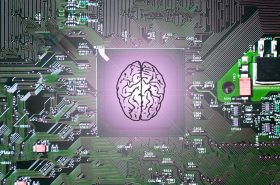What Is Artificial Intelligence?

Artificial Intelligence (AI) is the development of software and computing platforms that can replicate or even exceed human intelligence, which might include decision making, pattern recognition, predictive capabilities, and the understanding of languages, among other goals.
One of the main goals is to build intelligent machines that can supplement or replace human decision-making skills. However, in addition to replicating human intelligence, AI could also mean creating new forms of intelligence or exceeding human intelligence, a concept known as the technological singularity -- a moment in time when AI surpasses human intelligence, triggering a new era of technological growth with unforeseen impact on society. The term "singularity" is widely attributed to John von Neumann, but it has been popularized by AI expert Ray Kurzweil, who currently works at Google.
Much of the challenge in AI lies in teaching computers how to think for themselves, a subset of AI known as machine learning (insert link). Humans generally learn by observing experiences or other people. AI models could draw from wide sets of data to come up with new ways to learn.
Stanford University professor John McCarthy defined several areas of artificial intelligence, which include:
Logical AI: Defining specific facts about situations in which an AI program must act. Its goals are defined by mathematical logical language.
Search: Using AI to examine a wide number of possibilities and combinations. An example might be training a computer to examine and make moves in a chess game.
Pattern recognition: An AI program can examine patterns and compare them to define what it is matching. For example, examining many visual patterns of faces to find a match.
Inference: Mathematical logical deduction can be used to infer facts, but AI will have to explore new methods of inference and reasoning not involving mathematical formulas.
Epistemology: The study of the kinds of knowledge that are required to solve problems in the world.
Common sense and reasoning: This could be the most challenging area of AI because it is difficult to develop the type of reasoning that makes human intelligence unique.
Learning from experience: Teaching programs to do this using AI based on connections and neural networks.
Planning: Creating programs that observe facts about the world and generate strategy and actions to achieve a specific goal.
Ontology: The study of the kinds of things that exist and what their basic properties are. AI programs must be trained to deal with various objects. Emphasis on ontology begins in the 1990s.
Heuristics: Ways of discovering the process to learn about things or ideas.















